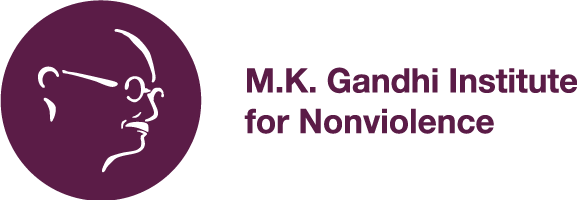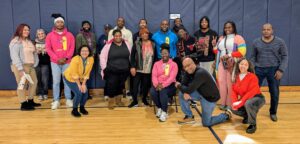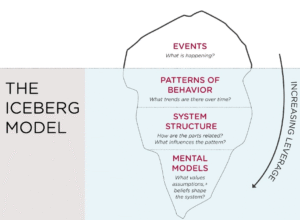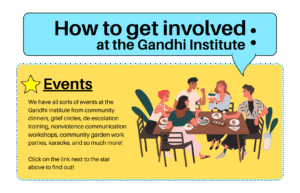Dear friends,
While I know that funders often want numbers and data about how the Gandhi Institute’s work is successful and effective, I want to share something that feels hard to quantify: how working at the Gandhi Institute for the past four and a half years has influenced my life.
When I started at the Institute, I was shy to speak in groups and lacked tools to apply nonviolence. I remember attending a class a colleague of mine taught and being afraid to share my opinion on the reading with the other six participants. Over the next couple of years, through the Gandhi Institute, Kit (the Director of the Institute) supported my participation in a number of high quality trainings: in restorative circles, peace circles, community conferencing, anti-racism and racial justice, Nonviolent Communication, trauma resiliency, and grief and empowerment work with Joanna Macy. I began to collect tools and knowledge about what nonviolence was in theory and practice. All along the way, I’ve been challenged to put these skills into action by teaching others. I remember the first time Kit proposed I lead an exercise in her Nonviolent Communication class. “Me?” I asked, with a squeaky voice.
Because of these opportunities and the support to both learn and teach, I’ve grown in my confidence to articulate the ideas and methods of nonviolence. I’ve grown in my facilitation skills to handle increasingly challenging groups with intense emotional dynamics. I am amazed that through the support of the Institute I’ve grown confident enough to give presentations on conflict transformation and communication to a room of strangers as well as facilitate multi-day workshops on nonviolence that I’ve personally designed.
Yet the most meaningful to me is that I’m becoming more of the person I want to be: more space for compassion, love, patience, understanding, generosity, kindness, and truthfulness to address harm and injustice. It is through being at the Institute that I’ve had the opportunity and support to practice all of these qualities–because they are valued here, as much as efficiency and productivity are valued in other work places.
I believe the Institute is unique because the organization is dedicated to more than just providing programs; we are dedicated to how we work together when in conflict, how we share power at staff meetings, how we greet visitors, how we take care of the house, how we collaborate with other organizations, and how we interact with distressed neighbors. All of these things can be invisible. Yet the how makes up our lives. As Gandhi taught, the means are as important as the ends, because the end result will reveal all the parts that came together to make it.
I cannot say how many youth we’ve touched through the Gandhi Institute’s programming, nor the particulars of how their lives have changed. I can say how my life has been nourished and reshaped over the past four and a half years of being here.
As the Institute currently struggles for funding, please consider what you may financially give to the Gandhi Institute, so that we can touch more lives.
I know that I was able to come here because financial resources were available to hire me, first as a Mennonite Service Volunteer, and then in 2012 as full-time staff. I sincerely hope that what I’ve experienced can be made available to those who come after me, whether through a nonviolence club, social justice class, community workshop, or by working at the Institute. Please donate for these people to come, who have beautiful qualities waiting to be watered and tended.
Please use this link to donate now: https://www.paypal.com/cgi-bin/webscr?cmd=_s-xclick&hosted_button_id=MN8ASNBQQTJ32
For those who have donated already, I give my sincere thanks. I hope sharing my story may bring you joy and meaning, knowing you’ve invested in something precious and worthwhile.
In deep gratitude,
Shannon
Shannon Richmond serves as the Associate Director of the Gandhi Institute.



